Total Training Solutions Adelaide: CHCDIS007 Empowerment Assessment
VerifiedAdded on 2022/11/23
|29
|5290
|1
Homework Assignment
AI Summary
This document presents a final assessment for the CHCDIS007 unit, which focuses on facilitating the empowerment of people with disabilities. The assessment, provided by Total Training Solutions Adelaide, covers various aspects, including the historical evolution of service models, legal frameworks like the Disability Discrimination Act and the UN Convention on the Rights of Persons with Disabilities, and practical application of person-centered approaches. The assessment is divided into two parts: questions designed to evaluate the candidate's knowledge of key concepts and a case study section that tests the ability to apply this knowledge in real-world scenarios. The document also outlines the importance of human rights, self-determination, and the ethical considerations involved in supporting individuals with disabilities. This assessment emphasizes the candidate's ability to demonstrate commitment to empowerment, foster human rights, and facilitate choice and self-determination in line with best practices in the field.
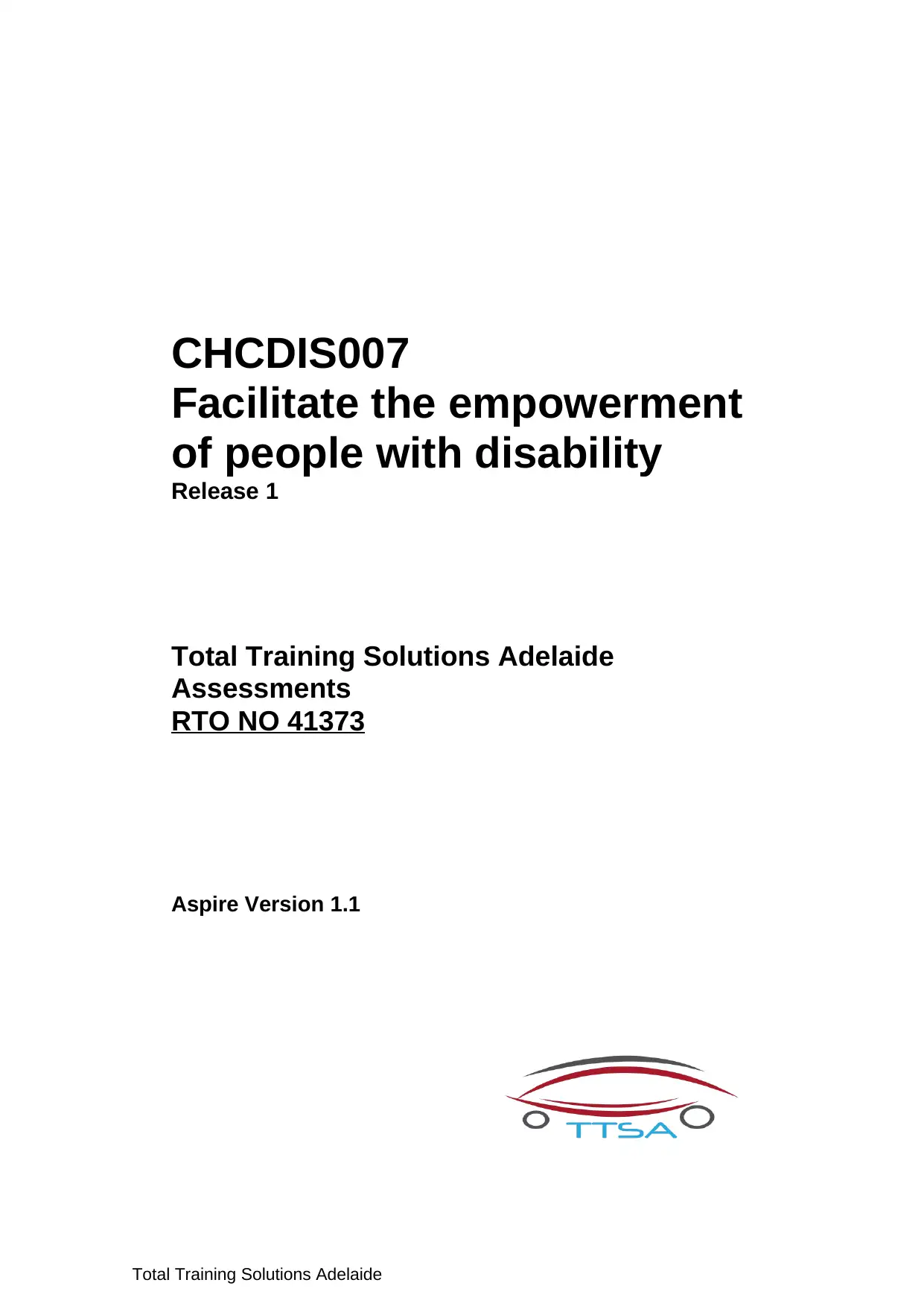
CHCDIS007
Facilitate the empowerment
of people with disability
Release 1
Total Training Solutions Adelaide
Assessments
RTO NO 41373
Aspire Version 1.1
Total Training Solutions Adelaide
Facilitate the empowerment
of people with disability
Release 1
Total Training Solutions Adelaide
Assessments
RTO NO 41373
Aspire Version 1.1
Total Training Solutions Adelaide
Paraphrase This Document
Need a fresh take? Get an instant paraphrase of this document with our AI Paraphraser
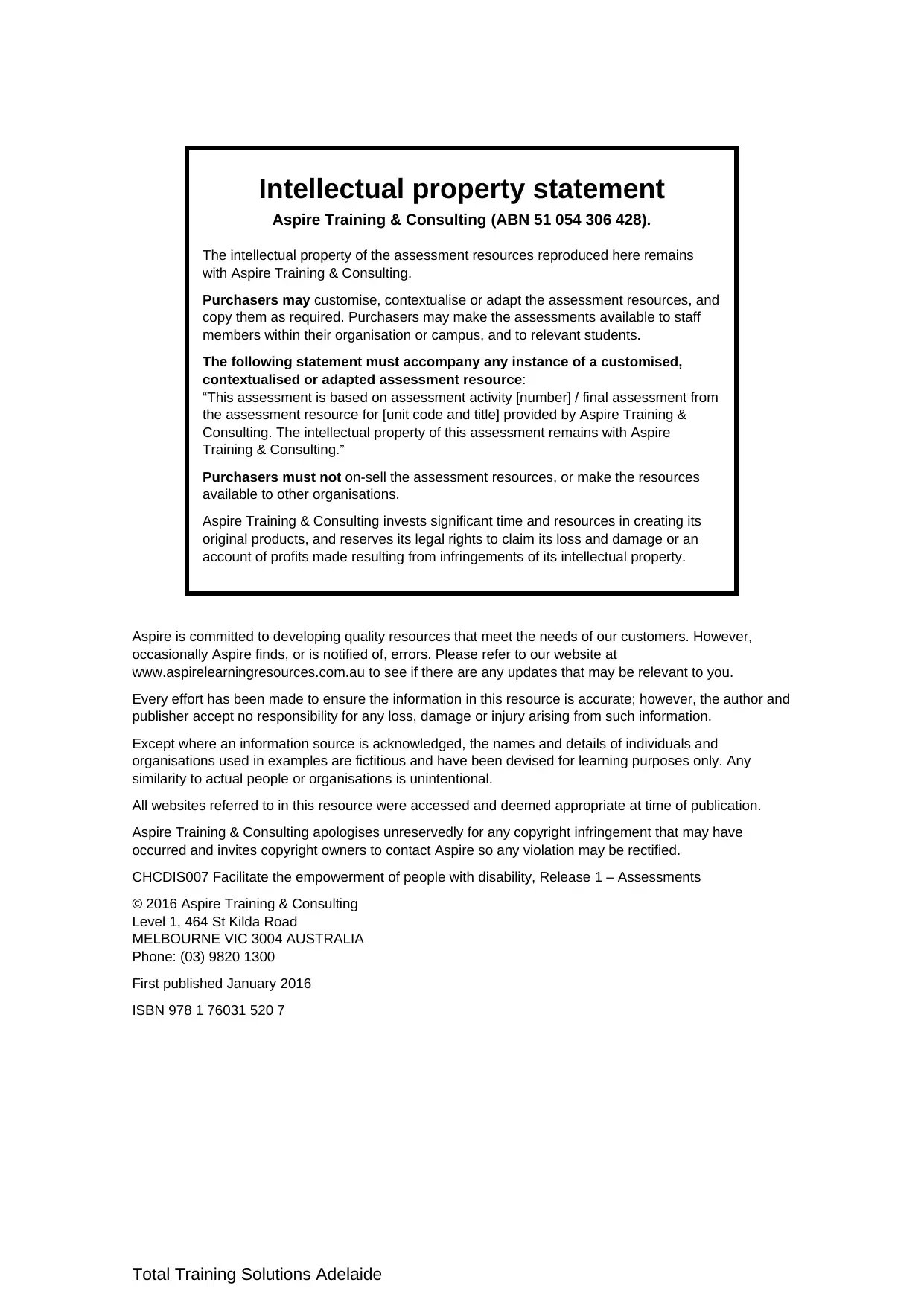
Intellectual property statement
Aspire Training & Consulting (ABN 51 054 306 428).
The intellectual property of the assessment resources reproduced here remains
with Aspire Training & Consulting.
Purchasers may customise, contextualise or adapt the assessment resources, and
copy them as required. Purchasers may make the assessments available to staff
members within their organisation or campus, and to relevant students.
The following statement must accompany any instance of a customised,
contextualised or adapted assessment resource:
“This assessment is based on assessment activity [number] / final assessment from
the assessment resource for [unit code and title] provided by Aspire Training &
Consulting. The intellectual property of this assessment remains with Aspire
Training & Consulting.”
Purchasers must not on-sell the assessment resources, or make the resources
available to other organisations.
Aspire Training & Consulting invests significant time and resources in creating its
original products, and reserves its legal rights to claim its loss and damage or an
account of profits made resulting from infringements of its intellectual property.
Aspire is committed to developing quality resources that meet the needs of our customers. However,
occasionally Aspire finds, or is notified of, errors. Please refer to our website at
www.aspirelearningresources.com.au to see if there are any updates that may be relevant to you.
Every effort has been made to ensure the information in this resource is accurate; however, the author and
publisher accept no responsibility for any loss, damage or injury arising from such information.
Except where an information source is acknowledged, the names and details of individuals and
organisations used in examples are fictitious and have been devised for learning purposes only. Any
similarity to actual people or organisations is unintentional.
All websites referred to in this resource were accessed and deemed appropriate at time of publication.
Aspire Training & Consulting apologises unreservedly for any copyright infringement that may have
occurred and invites copyright owners to contact Aspire so any violation may be rectified.
CHCDIS007 Facilitate the empowerment of people with disability, Release 1 – Assessments
© 2016 Aspire Training & Consulting
Level 1, 464 St Kilda Road
MELBOURNE VIC 3004 AUSTRALIA
Phone: (03) 9820 1300
First published January 2016
ISBN 978 1 76031 520 7
Total Training Solutions Adelaide
Aspire Training & Consulting (ABN 51 054 306 428).
The intellectual property of the assessment resources reproduced here remains
with Aspire Training & Consulting.
Purchasers may customise, contextualise or adapt the assessment resources, and
copy them as required. Purchasers may make the assessments available to staff
members within their organisation or campus, and to relevant students.
The following statement must accompany any instance of a customised,
contextualised or adapted assessment resource:
“This assessment is based on assessment activity [number] / final assessment from
the assessment resource for [unit code and title] provided by Aspire Training &
Consulting. The intellectual property of this assessment remains with Aspire
Training & Consulting.”
Purchasers must not on-sell the assessment resources, or make the resources
available to other organisations.
Aspire Training & Consulting invests significant time and resources in creating its
original products, and reserves its legal rights to claim its loss and damage or an
account of profits made resulting from infringements of its intellectual property.
Aspire is committed to developing quality resources that meet the needs of our customers. However,
occasionally Aspire finds, or is notified of, errors. Please refer to our website at
www.aspirelearningresources.com.au to see if there are any updates that may be relevant to you.
Every effort has been made to ensure the information in this resource is accurate; however, the author and
publisher accept no responsibility for any loss, damage or injury arising from such information.
Except where an information source is acknowledged, the names and details of individuals and
organisations used in examples are fictitious and have been devised for learning purposes only. Any
similarity to actual people or organisations is unintentional.
All websites referred to in this resource were accessed and deemed appropriate at time of publication.
Aspire Training & Consulting apologises unreservedly for any copyright infringement that may have
occurred and invites copyright owners to contact Aspire so any violation may be rectified.
CHCDIS007 Facilitate the empowerment of people with disability, Release 1 – Assessments
© 2016 Aspire Training & Consulting
Level 1, 464 St Kilda Road
MELBOURNE VIC 3004 AUSTRALIA
Phone: (03) 9820 1300
First published January 2016
ISBN 978 1 76031 520 7
Total Training Solutions Adelaide
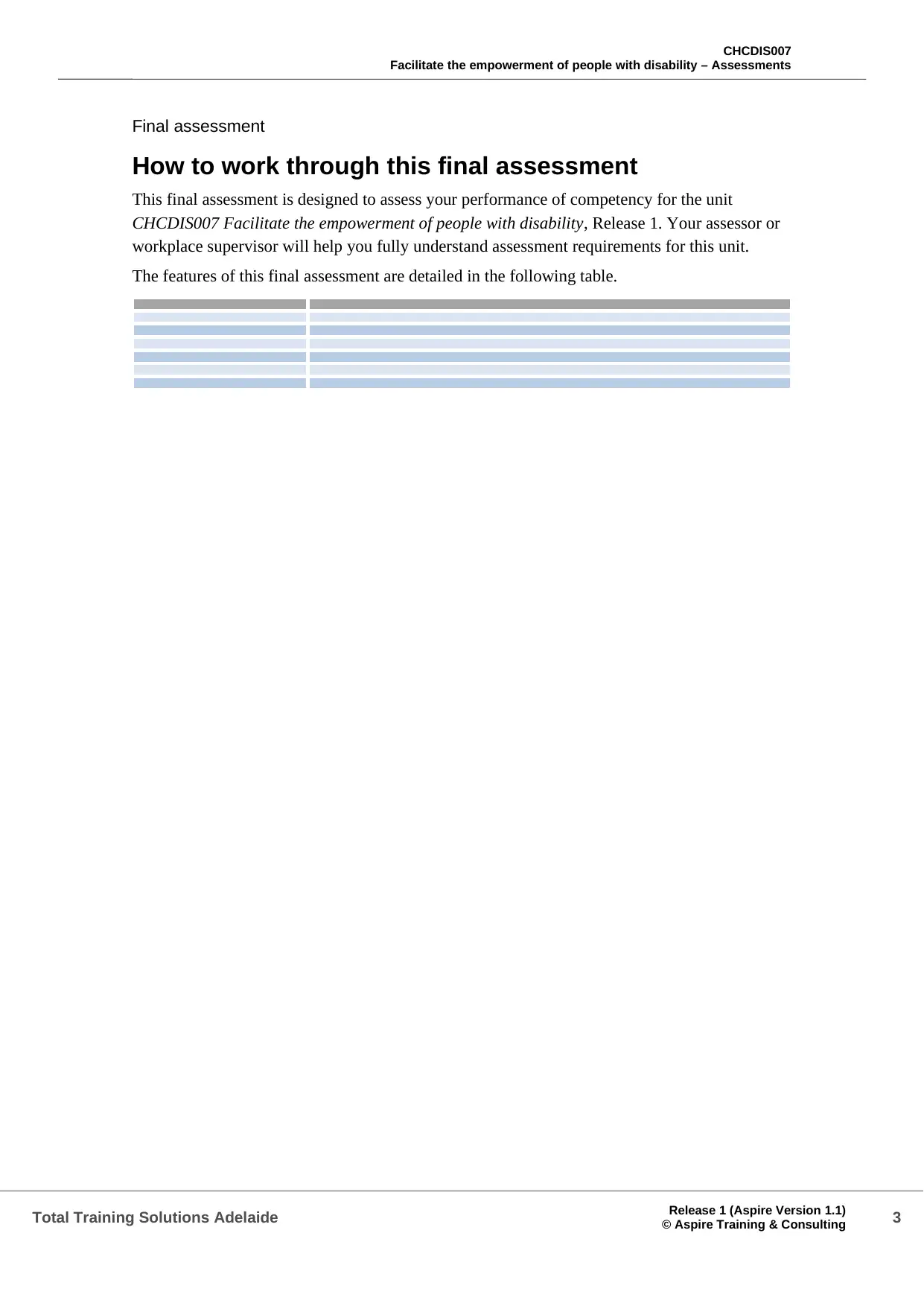
CHCDIS007
Facilitate the empowerment of people with disability – Assessments
Final assessment
How to work through this final assessment
This final assessment is designed to assess your performance of competency for the unit
CHCDIS007 Facilitate the empowerment of people with disability, Release 1. Your assessor or
workplace supervisor will help you fully understand assessment requirements for this unit.
The features of this final assessment are detailed in the following table.
Total Training Solutions Adelaide Release 1 (Aspire Version 1.1)
© Aspire Training & Consulting 3
Facilitate the empowerment of people with disability – Assessments
Final assessment
How to work through this final assessment
This final assessment is designed to assess your performance of competency for the unit
CHCDIS007 Facilitate the empowerment of people with disability, Release 1. Your assessor or
workplace supervisor will help you fully understand assessment requirements for this unit.
The features of this final assessment are detailed in the following table.
Total Training Solutions Adelaide Release 1 (Aspire Version 1.1)
© Aspire Training & Consulting 3
⊘ This is a preview!⊘
Do you want full access?
Subscribe today to unlock all pages.

Trusted by 1+ million students worldwide
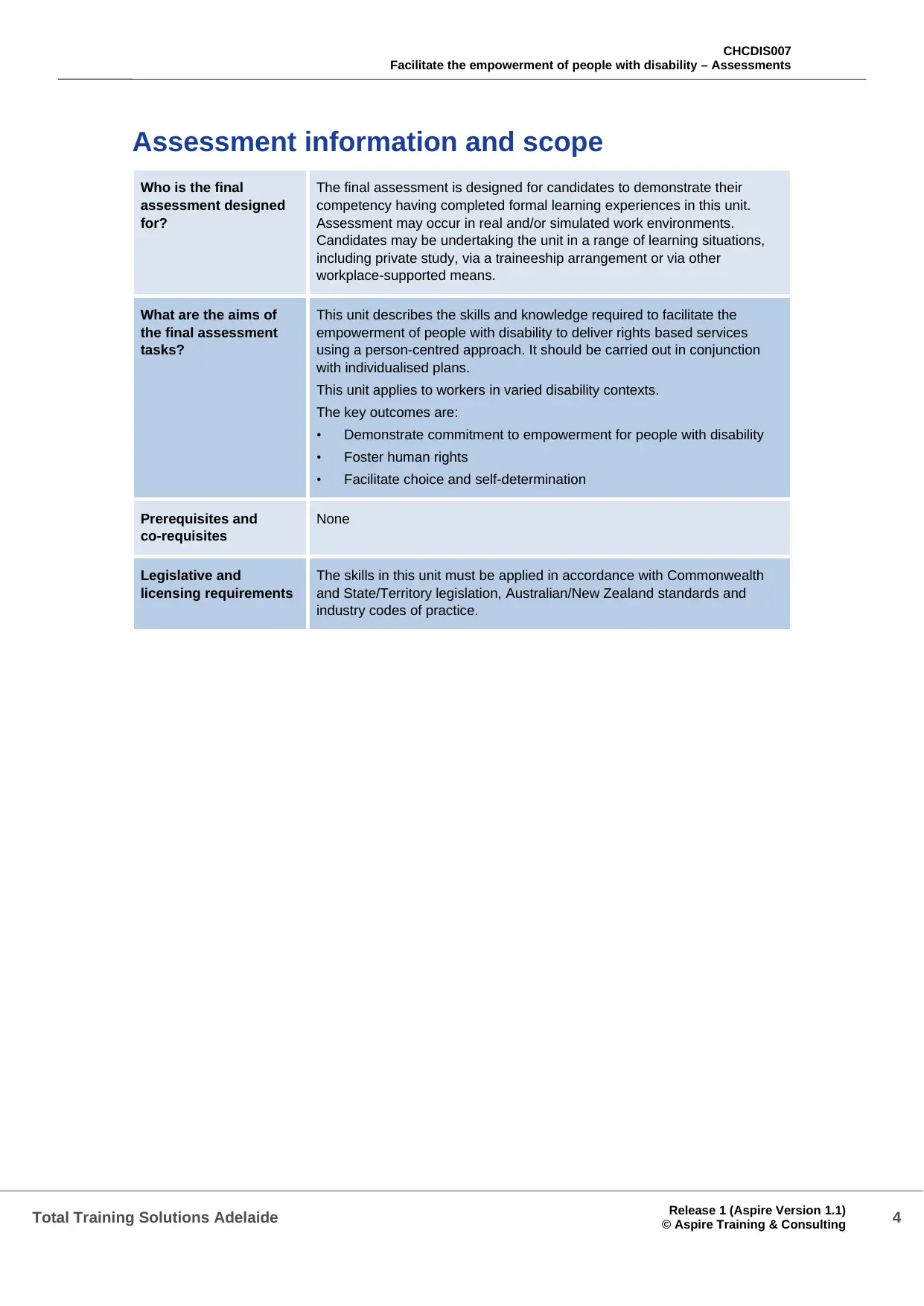
CHCDIS007
Facilitate the empowerment of people with disability – Assessments
Assessment information and scope
Who is the final
assessment designed
for?
The final assessment is designed for candidates to demonstrate their
competency having completed formal learning experiences in this unit.
Assessment may occur in real and/or simulated work environments.
Candidates may be undertaking the unit in a range of learning situations,
including private study, via a traineeship arrangement or via other
workplace-supported means.
What are the aims of
the final assessment
tasks?
This unit describes the skills and knowledge required to facilitate the
empowerment of people with disability to deliver rights based services
using a person-centred approach. It should be carried out in conjunction
with individualised plans.
This unit applies to workers in varied disability contexts.
The key outcomes are:
• Demonstrate commitment to empowerment for people with disability
• Foster human rights
• Facilitate choice and self-determination
Prerequisites and
co-requisites
None
Legislative and
licensing requirements
The skills in this unit must be applied in accordance with Commonwealth
and State/Territory legislation, Australian/New Zealand standards and
industry codes of practice.
Total Training Solutions Adelaide Release 1 (Aspire Version 1.1)
© Aspire Training & Consulting 4
Facilitate the empowerment of people with disability – Assessments
Assessment information and scope
Who is the final
assessment designed
for?
The final assessment is designed for candidates to demonstrate their
competency having completed formal learning experiences in this unit.
Assessment may occur in real and/or simulated work environments.
Candidates may be undertaking the unit in a range of learning situations,
including private study, via a traineeship arrangement or via other
workplace-supported means.
What are the aims of
the final assessment
tasks?
This unit describes the skills and knowledge required to facilitate the
empowerment of people with disability to deliver rights based services
using a person-centred approach. It should be carried out in conjunction
with individualised plans.
This unit applies to workers in varied disability contexts.
The key outcomes are:
• Demonstrate commitment to empowerment for people with disability
• Foster human rights
• Facilitate choice and self-determination
Prerequisites and
co-requisites
None
Legislative and
licensing requirements
The skills in this unit must be applied in accordance with Commonwealth
and State/Territory legislation, Australian/New Zealand standards and
industry codes of practice.
Total Training Solutions Adelaide Release 1 (Aspire Version 1.1)
© Aspire Training & Consulting 4
Paraphrase This Document
Need a fresh take? Get an instant paraphrase of this document with our AI Paraphraser
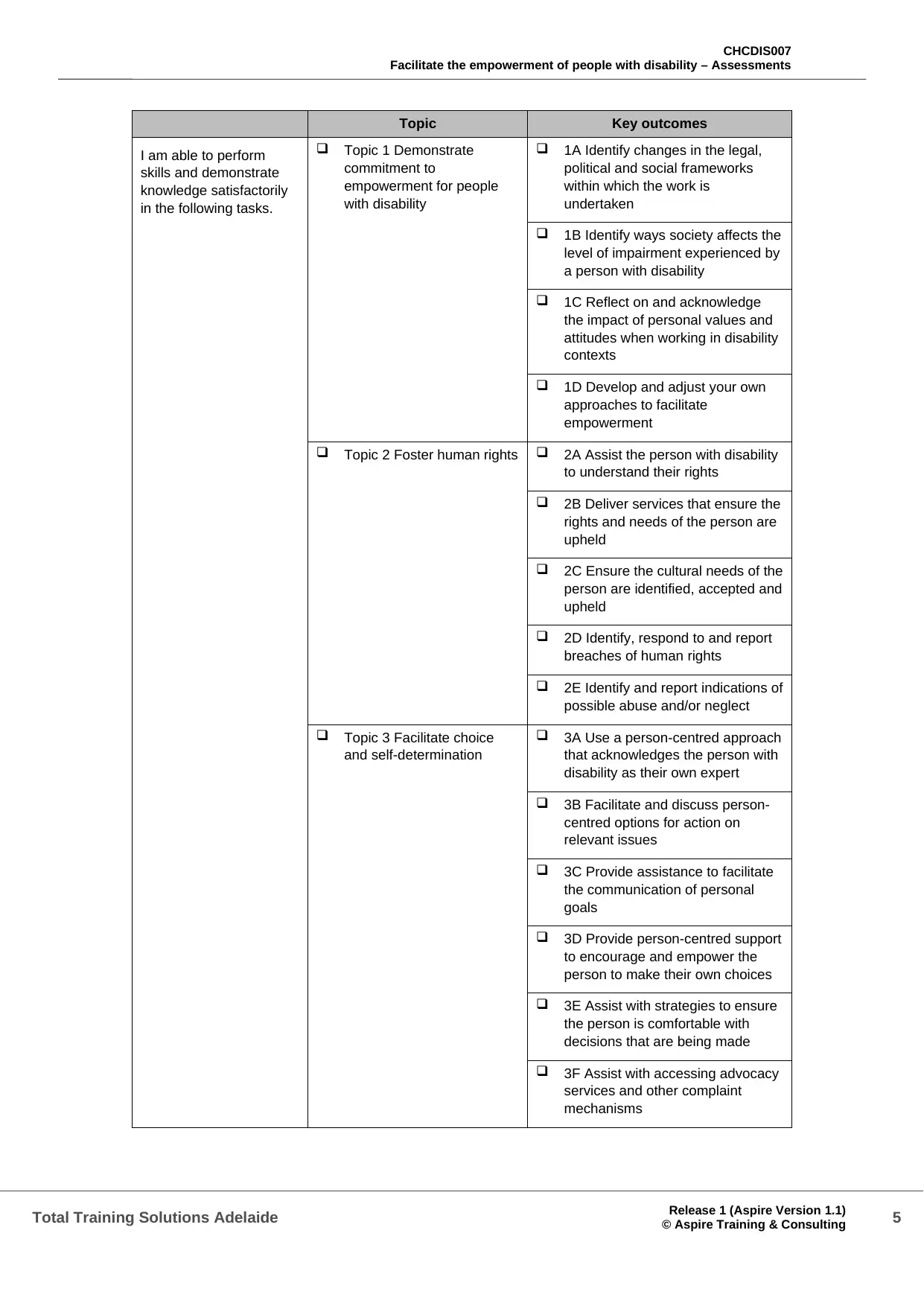
CHCDIS007
Facilitate the empowerment of people with disability – Assessments
Topic Key outcomes
I am able to perform
skills and demonstrate
knowledge satisfactorily
in the following tasks.
q Topic 1 Demonstrate
commitment to
empowerment for people
with disability
q 1A Identify changes in the legal,
political and social frameworks
within which the work is
undertaken
q 1B Identify ways society affects the
level of impairment experienced by
a person with disability
q 1C Reflect on and acknowledge
the impact of personal values and
attitudes when working in disability
contexts
q 1D Develop and adjust your own
approaches to facilitate
empowerment
q Topic 2 Foster human rights q 2A Assist the person with disability
to understand their rights
q 2B Deliver services that ensure the
rights and needs of the person are
upheld
q 2C Ensure the cultural needs of the
person are identified, accepted and
upheld
q 2D Identify, respond to and report
breaches of human rights
q 2E Identify and report indications of
possible abuse and/or neglect
q Topic 3 Facilitate choice
and self-determination
q 3A Use a person-centred approach
that acknowledges the person with
disability as their own expert
q 3B Facilitate and discuss person-
centred options for action on
relevant issues
q 3C Provide assistance to facilitate
the communication of personal
goals
q 3D Provide person-centred support
to encourage and empower the
person to make their own choices
q 3E Assist with strategies to ensure
the person is comfortable with
decisions that are being made
q 3F Assist with accessing advocacy
services and other complaint
mechanisms
Total Training Solutions Adelaide Release 1 (Aspire Version 1.1)
© Aspire Training & Consulting 5
Facilitate the empowerment of people with disability – Assessments
Topic Key outcomes
I am able to perform
skills and demonstrate
knowledge satisfactorily
in the following tasks.
q Topic 1 Demonstrate
commitment to
empowerment for people
with disability
q 1A Identify changes in the legal,
political and social frameworks
within which the work is
undertaken
q 1B Identify ways society affects the
level of impairment experienced by
a person with disability
q 1C Reflect on and acknowledge
the impact of personal values and
attitudes when working in disability
contexts
q 1D Develop and adjust your own
approaches to facilitate
empowerment
q Topic 2 Foster human rights q 2A Assist the person with disability
to understand their rights
q 2B Deliver services that ensure the
rights and needs of the person are
upheld
q 2C Ensure the cultural needs of the
person are identified, accepted and
upheld
q 2D Identify, respond to and report
breaches of human rights
q 2E Identify and report indications of
possible abuse and/or neglect
q Topic 3 Facilitate choice
and self-determination
q 3A Use a person-centred approach
that acknowledges the person with
disability as their own expert
q 3B Facilitate and discuss person-
centred options for action on
relevant issues
q 3C Provide assistance to facilitate
the communication of personal
goals
q 3D Provide person-centred support
to encourage and empower the
person to make their own choices
q 3E Assist with strategies to ensure
the person is comfortable with
decisions that are being made
q 3F Assist with accessing advocacy
services and other complaint
mechanisms
Total Training Solutions Adelaide Release 1 (Aspire Version 1.1)
© Aspire Training & Consulting 5
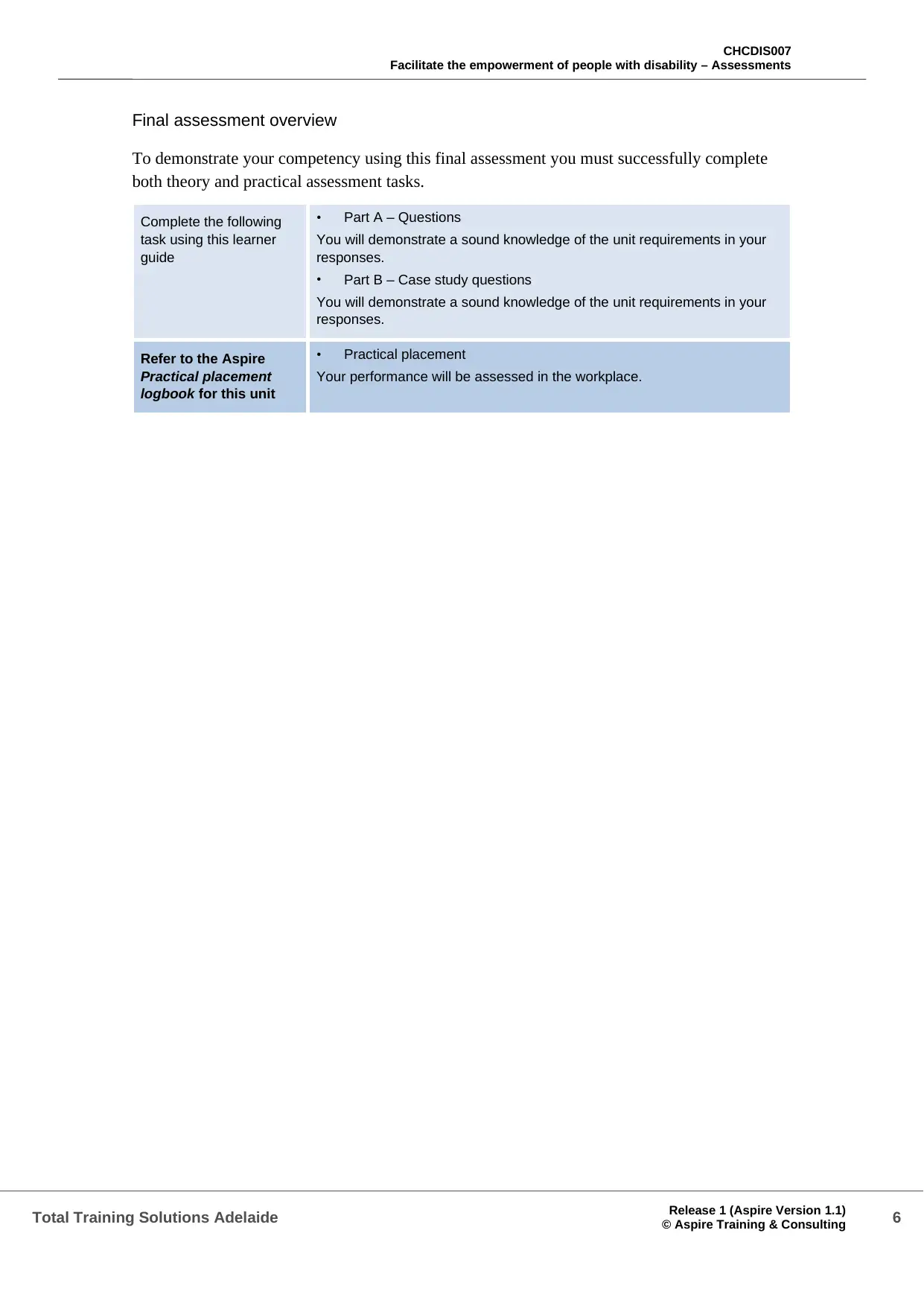
CHCDIS007
Facilitate the empowerment of people with disability – Assessments
Final assessment overview
To demonstrate your competency using this final assessment you must successfully complete
both theory and practical assessment tasks.
Complete the following
task using this learner
guide
• Part A – Questions
You will demonstrate a sound knowledge of the unit requirements in your
responses.
• Part B – Case study questions
You will demonstrate a sound knowledge of the unit requirements in your
responses.
Refer to the Aspire
Practical placement
logbook for this unit
• Practical placement
Your performance will be assessed in the workplace.
Total Training Solutions Adelaide Release 1 (Aspire Version 1.1)
© Aspire Training & Consulting 6
Facilitate the empowerment of people with disability – Assessments
Final assessment overview
To demonstrate your competency using this final assessment you must successfully complete
both theory and practical assessment tasks.
Complete the following
task using this learner
guide
• Part A – Questions
You will demonstrate a sound knowledge of the unit requirements in your
responses.
• Part B – Case study questions
You will demonstrate a sound knowledge of the unit requirements in your
responses.
Refer to the Aspire
Practical placement
logbook for this unit
• Practical placement
Your performance will be assessed in the workplace.
Total Training Solutions Adelaide Release 1 (Aspire Version 1.1)
© Aspire Training & Consulting 6
⊘ This is a preview!⊘
Do you want full access?
Subscribe today to unlock all pages.

Trusted by 1+ million students worldwide
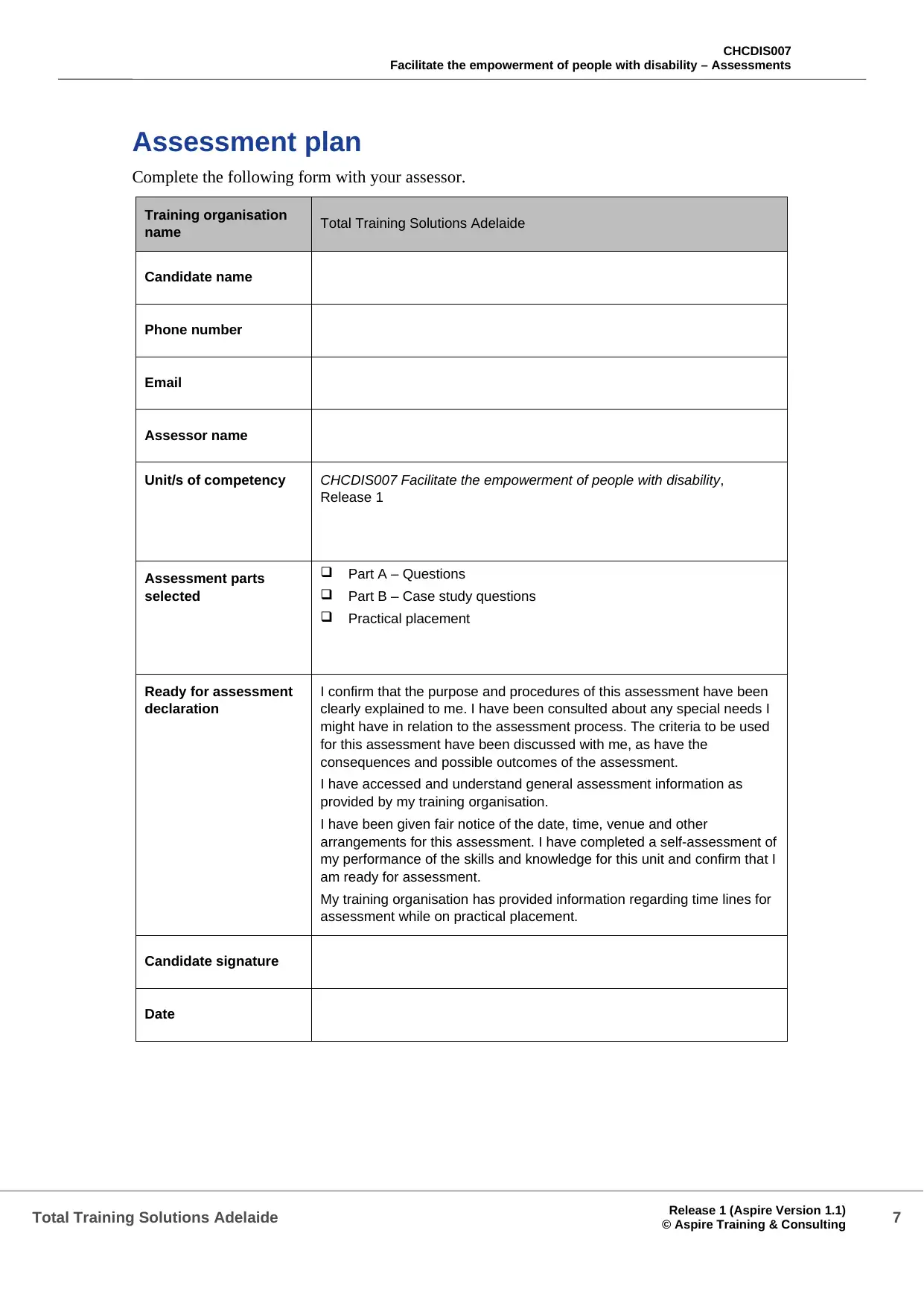
CHCDIS007
Facilitate the empowerment of people with disability – Assessments
Assessment plan
Complete the following form with your assessor.
Training organisation
name Total Training Solutions Adelaide
Candidate name
Phone number
Email
Assessor name
Unit/s of competency CHCDIS007 Facilitate the empowerment of people with disability,
Release 1
Assessment parts
selected
q Part A – Questions
q Part B – Case study questions
q Practical placement
Ready for assessment
declaration
I confirm that the purpose and procedures of this assessment have been
clearly explained to me. I have been consulted about any special needs I
might have in relation to the assessment process. The criteria to be used
for this assessment have been discussed with me, as have the
consequences and possible outcomes of the assessment.
I have accessed and understand general assessment information as
provided by my training organisation.
I have been given fair notice of the date, time, venue and other
arrangements for this assessment. I have completed a self-assessment of
my performance of the skills and knowledge for this unit and confirm that I
am ready for assessment.
My training organisation has provided information regarding time lines for
assessment while on practical placement.
Candidate signature
Date
Total Training Solutions Adelaide Release 1 (Aspire Version 1.1)
© Aspire Training & Consulting 7
Facilitate the empowerment of people with disability – Assessments
Assessment plan
Complete the following form with your assessor.
Training organisation
name Total Training Solutions Adelaide
Candidate name
Phone number
Assessor name
Unit/s of competency CHCDIS007 Facilitate the empowerment of people with disability,
Release 1
Assessment parts
selected
q Part A – Questions
q Part B – Case study questions
q Practical placement
Ready for assessment
declaration
I confirm that the purpose and procedures of this assessment have been
clearly explained to me. I have been consulted about any special needs I
might have in relation to the assessment process. The criteria to be used
for this assessment have been discussed with me, as have the
consequences and possible outcomes of the assessment.
I have accessed and understand general assessment information as
provided by my training organisation.
I have been given fair notice of the date, time, venue and other
arrangements for this assessment. I have completed a self-assessment of
my performance of the skills and knowledge for this unit and confirm that I
am ready for assessment.
My training organisation has provided information regarding time lines for
assessment while on practical placement.
Candidate signature
Date
Total Training Solutions Adelaide Release 1 (Aspire Version 1.1)
© Aspire Training & Consulting 7
Paraphrase This Document
Need a fresh take? Get an instant paraphrase of this document with our AI Paraphraser
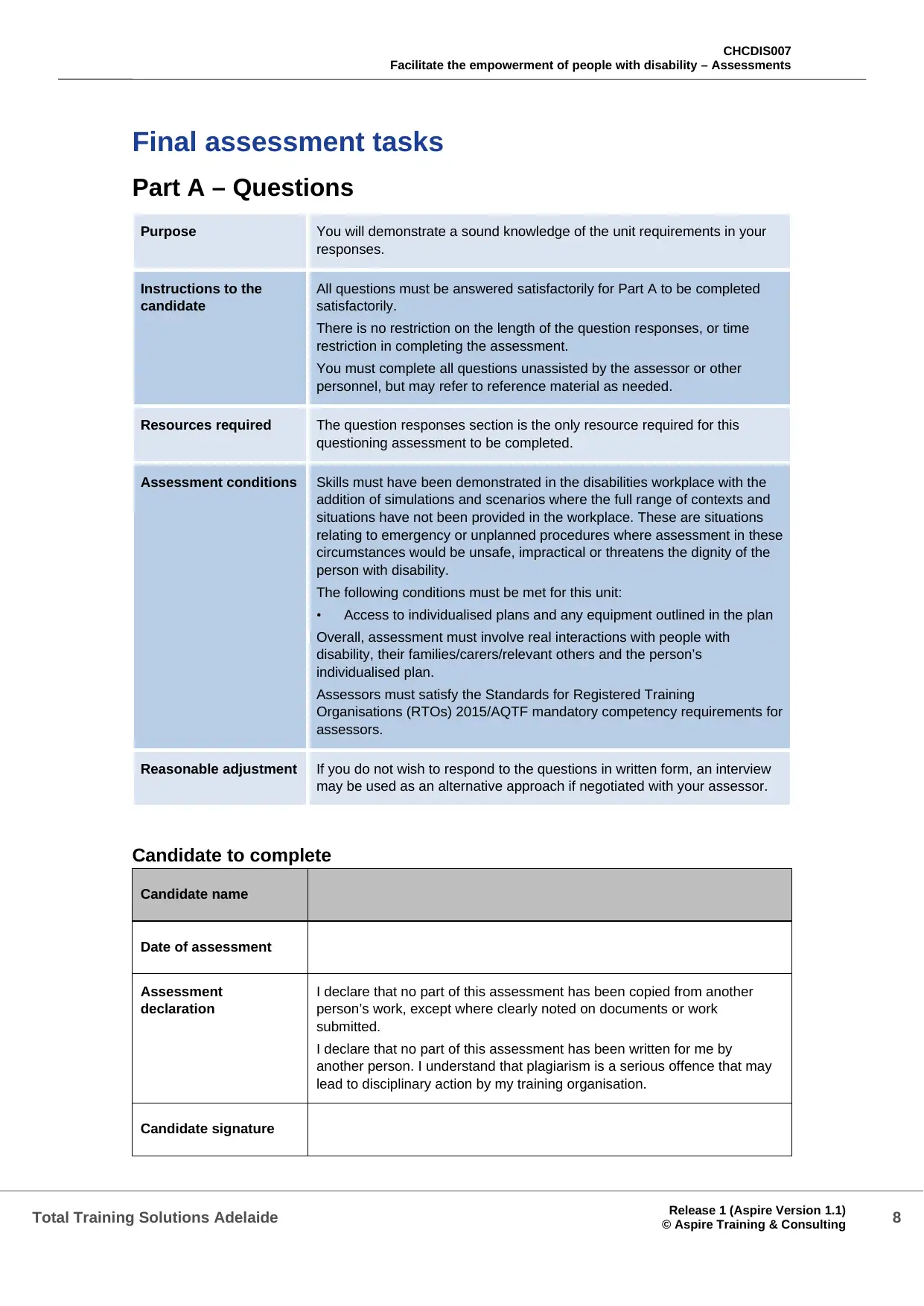
CHCDIS007
Facilitate the empowerment of people with disability – Assessments
Final assessment tasks
Part A – Questions
Purpose You will demonstrate a sound knowledge of the unit requirements in your
responses.
Instructions to the
candidate
All questions must be answered satisfactorily for Part A to be completed
satisfactorily.
There is no restriction on the length of the question responses, or time
restriction in completing the assessment.
You must complete all questions unassisted by the assessor or other
personnel, but may refer to reference material as needed.
Resources required The question responses section is the only resource required for this
questioning assessment to be completed.
Assessment conditions Skills must have been demonstrated in the disabilities workplace with the
addition of simulations and scenarios where the full range of contexts and
situations have not been provided in the workplace. These are situations
relating to emergency or unplanned procedures where assessment in these
circumstances would be unsafe, impractical or threatens the dignity of the
person with disability.
The following conditions must be met for this unit:
• Access to individualised plans and any equipment outlined in the plan
Overall, assessment must involve real interactions with people with
disability, their families/carers/relevant others and the person’s
individualised plan.
Assessors must satisfy the Standards for Registered Training
Organisations (RTOs) 2015/AQTF mandatory competency requirements for
assessors.
Reasonable adjustment If you do not wish to respond to the questions in written form, an interview
may be used as an alternative approach if negotiated with your assessor.
Candidate to complete
Candidate name
Date of assessment
Assessment
declaration
I declare that no part of this assessment has been copied from another
person’s work, except where clearly noted on documents or work
submitted.
I declare that no part of this assessment has been written for me by
another person. I understand that plagiarism is a serious offence that may
lead to disciplinary action by my training organisation.
Candidate signature
Total Training Solutions Adelaide Release 1 (Aspire Version 1.1)
© Aspire Training & Consulting 8
Facilitate the empowerment of people with disability – Assessments
Final assessment tasks
Part A – Questions
Purpose You will demonstrate a sound knowledge of the unit requirements in your
responses.
Instructions to the
candidate
All questions must be answered satisfactorily for Part A to be completed
satisfactorily.
There is no restriction on the length of the question responses, or time
restriction in completing the assessment.
You must complete all questions unassisted by the assessor or other
personnel, but may refer to reference material as needed.
Resources required The question responses section is the only resource required for this
questioning assessment to be completed.
Assessment conditions Skills must have been demonstrated in the disabilities workplace with the
addition of simulations and scenarios where the full range of contexts and
situations have not been provided in the workplace. These are situations
relating to emergency or unplanned procedures where assessment in these
circumstances would be unsafe, impractical or threatens the dignity of the
person with disability.
The following conditions must be met for this unit:
• Access to individualised plans and any equipment outlined in the plan
Overall, assessment must involve real interactions with people with
disability, their families/carers/relevant others and the person’s
individualised plan.
Assessors must satisfy the Standards for Registered Training
Organisations (RTOs) 2015/AQTF mandatory competency requirements for
assessors.
Reasonable adjustment If you do not wish to respond to the questions in written form, an interview
may be used as an alternative approach if negotiated with your assessor.
Candidate to complete
Candidate name
Date of assessment
Assessment
declaration
I declare that no part of this assessment has been copied from another
person’s work, except where clearly noted on documents or work
submitted.
I declare that no part of this assessment has been written for me by
another person. I understand that plagiarism is a serious offence that may
lead to disciplinary action by my training organisation.
Candidate signature
Total Training Solutions Adelaide Release 1 (Aspire Version 1.1)
© Aspire Training & Consulting 8
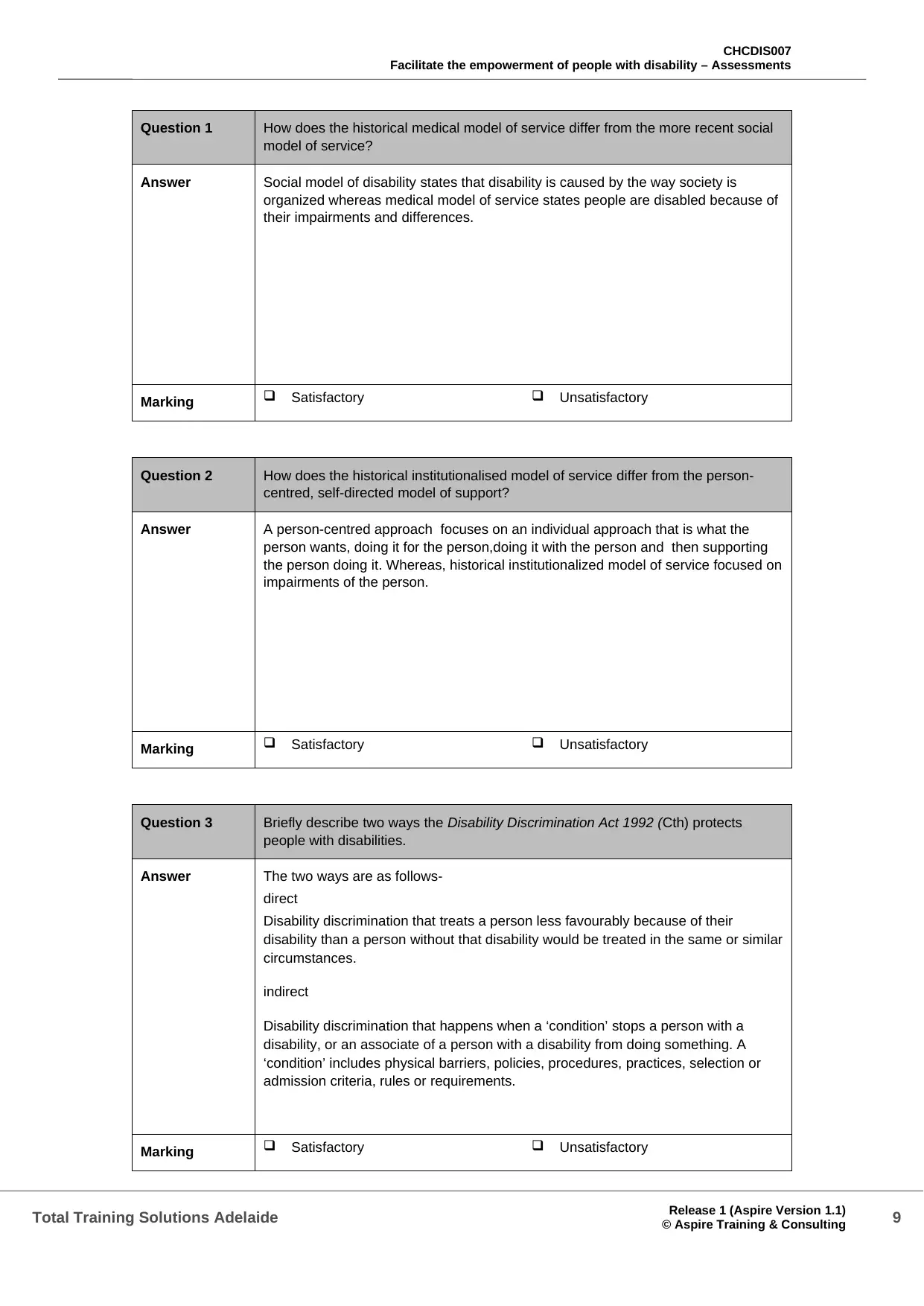
CHCDIS007
Facilitate the empowerment of people with disability – Assessments
Question 1 How does the historical medical model of service differ from the more recent social
model of service?
Answer Social model of disability states that disability is caused by the way society is
organized whereas medical model of service states people are disabled because of
their impairments and differences.
Marking q Satisfactory q Unsatisfactory
Question 2 How does the historical institutionalised model of service differ from the person-
centred, self-directed model of support?
Answer A person-centred approach focuses on an individual approach that is what the
person wants, doing it for the person,doing it with the person and then supporting
the person doing it. Whereas, historical institutionalized model of service focused on
impairments of the person.
Marking q Satisfactory q Unsatisfactory
Question 3 Briefly describe two ways the Disability Discrimination Act 1992 (Cth) protects
people with disabilities.
Answer The two ways are as follows-
direct
Disability discrimination that treats a person less favourably because of their
disability than a person without that disability would be treated in the same or similar
circumstances.
indirect
Disability discrimination that happens when a ‘condition’ stops a person with a
disability, or an associate of a person with a disability from doing something. A
‘condition’ includes physical barriers, policies, procedures, practices, selection or
admission criteria, rules or requirements.
Marking q Satisfactory q Unsatisfactory
Total Training Solutions Adelaide Release 1 (Aspire Version 1.1)
© Aspire Training & Consulting 9
Facilitate the empowerment of people with disability – Assessments
Question 1 How does the historical medical model of service differ from the more recent social
model of service?
Answer Social model of disability states that disability is caused by the way society is
organized whereas medical model of service states people are disabled because of
their impairments and differences.
Marking q Satisfactory q Unsatisfactory
Question 2 How does the historical institutionalised model of service differ from the person-
centred, self-directed model of support?
Answer A person-centred approach focuses on an individual approach that is what the
person wants, doing it for the person,doing it with the person and then supporting
the person doing it. Whereas, historical institutionalized model of service focused on
impairments of the person.
Marking q Satisfactory q Unsatisfactory
Question 3 Briefly describe two ways the Disability Discrimination Act 1992 (Cth) protects
people with disabilities.
Answer The two ways are as follows-
direct
Disability discrimination that treats a person less favourably because of their
disability than a person without that disability would be treated in the same or similar
circumstances.
indirect
Disability discrimination that happens when a ‘condition’ stops a person with a
disability, or an associate of a person with a disability from doing something. A
‘condition’ includes physical barriers, policies, procedures, practices, selection or
admission criteria, rules or requirements.
Marking q Satisfactory q Unsatisfactory
Total Training Solutions Adelaide Release 1 (Aspire Version 1.1)
© Aspire Training & Consulting 9
⊘ This is a preview!⊘
Do you want full access?
Subscribe today to unlock all pages.

Trusted by 1+ million students worldwide
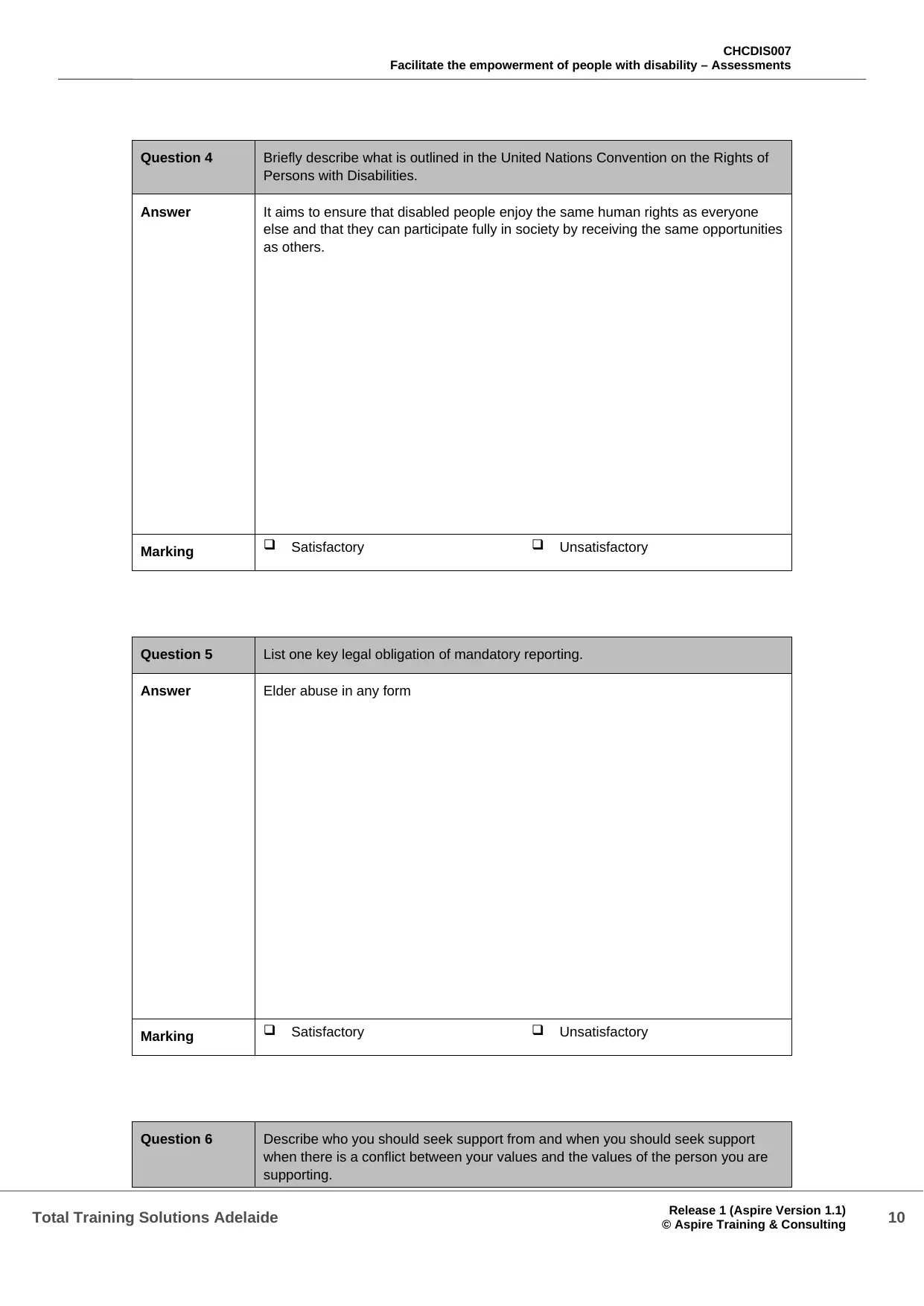
CHCDIS007
Facilitate the empowerment of people with disability – Assessments
Question 4 Briefly describe what is outlined in the United Nations Convention on the Rights of
Persons with Disabilities.
Answer It aims to ensure that disabled people enjoy the same human rights as everyone
else and that they can participate fully in society by receiving the same opportunities
as others.
Marking q Satisfactory q Unsatisfactory
Question 5 List one key legal obligation of mandatory reporting.
Answer Elder abuse in any form
Marking q Satisfactory q Unsatisfactory
Question 6 Describe who you should seek support from and when you should seek support
when there is a conflict between your values and the values of the person you are
supporting.
Total Training Solutions Adelaide Release 1 (Aspire Version 1.1)
© Aspire Training & Consulting 10
Facilitate the empowerment of people with disability – Assessments
Question 4 Briefly describe what is outlined in the United Nations Convention on the Rights of
Persons with Disabilities.
Answer It aims to ensure that disabled people enjoy the same human rights as everyone
else and that they can participate fully in society by receiving the same opportunities
as others.
Marking q Satisfactory q Unsatisfactory
Question 5 List one key legal obligation of mandatory reporting.
Answer Elder abuse in any form
Marking q Satisfactory q Unsatisfactory
Question 6 Describe who you should seek support from and when you should seek support
when there is a conflict between your values and the values of the person you are
supporting.
Total Training Solutions Adelaide Release 1 (Aspire Version 1.1)
© Aspire Training & Consulting 10
Paraphrase This Document
Need a fresh take? Get an instant paraphrase of this document with our AI Paraphraser
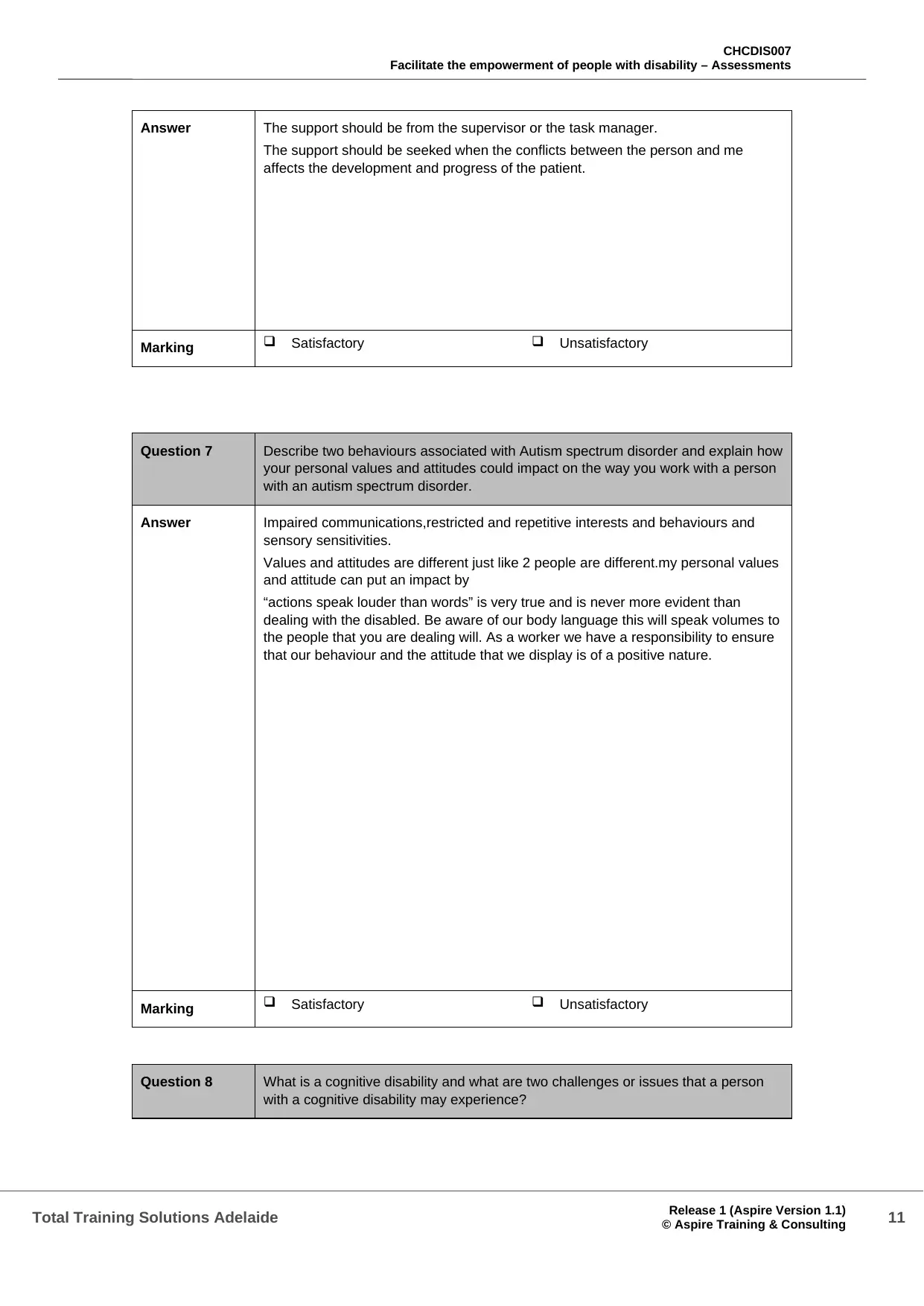
CHCDIS007
Facilitate the empowerment of people with disability – Assessments
Answer The support should be from the supervisor or the task manager.
The support should be seeked when the conflicts between the person and me
affects the development and progress of the patient.
Marking q Satisfactory q Unsatisfactory
Question 7 Describe two behaviours associated with Autism spectrum disorder and explain how
your personal values and attitudes could impact on the way you work with a person
with an autism spectrum disorder.
Answer Impaired communications,restricted and repetitive interests and behaviours and
sensory sensitivities.
Values and attitudes are different just like 2 people are different.my personal values
and attitude can put an impact by
“actions speak louder than words” is very true and is never more evident than
dealing with the disabled. Be aware of our body language this will speak volumes to
the people that you are dealing will. As a worker we have a responsibility to ensure
that our behaviour and the attitude that we display is of a positive nature.
Marking q Satisfactory q Unsatisfactory
Question 8 What is a cognitive disability and what are two challenges or issues that a person
with a cognitive disability may experience?
Total Training Solutions Adelaide Release 1 (Aspire Version 1.1)
© Aspire Training & Consulting 11
Facilitate the empowerment of people with disability – Assessments
Answer The support should be from the supervisor or the task manager.
The support should be seeked when the conflicts between the person and me
affects the development and progress of the patient.
Marking q Satisfactory q Unsatisfactory
Question 7 Describe two behaviours associated with Autism spectrum disorder and explain how
your personal values and attitudes could impact on the way you work with a person
with an autism spectrum disorder.
Answer Impaired communications,restricted and repetitive interests and behaviours and
sensory sensitivities.
Values and attitudes are different just like 2 people are different.my personal values
and attitude can put an impact by
“actions speak louder than words” is very true and is never more evident than
dealing with the disabled. Be aware of our body language this will speak volumes to
the people that you are dealing will. As a worker we have a responsibility to ensure
that our behaviour and the attitude that we display is of a positive nature.
Marking q Satisfactory q Unsatisfactory
Question 8 What is a cognitive disability and what are two challenges or issues that a person
with a cognitive disability may experience?
Total Training Solutions Adelaide Release 1 (Aspire Version 1.1)
© Aspire Training & Consulting 11
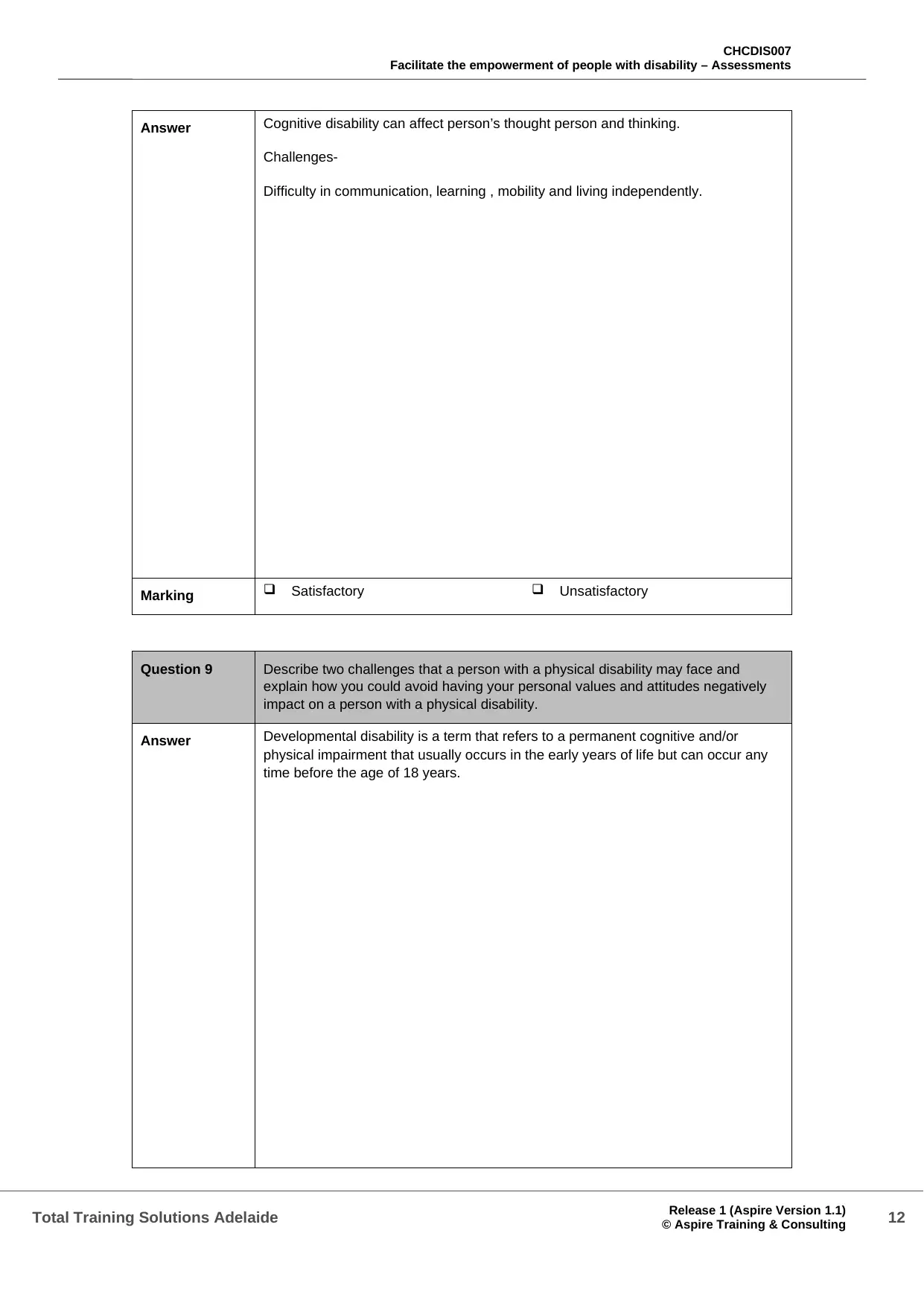
CHCDIS007
Facilitate the empowerment of people with disability – Assessments
Answer Cognitive disability can affect person’s thought person and thinking.
Challenges-
Difficulty in communication, learning , mobility and living independently.
Marking q Satisfactory q Unsatisfactory
Question 9 Describe two challenges that a person with a physical disability may face and
explain how you could avoid having your personal values and attitudes negatively
impact on a person with a physical disability.
Answer Developmental disability is a term that refers to a permanent cognitive and/or
physical impairment that usually occurs in the early years of life but can occur any
time before the age of 18 years.
Total Training Solutions Adelaide Release 1 (Aspire Version 1.1)
© Aspire Training & Consulting 12
Facilitate the empowerment of people with disability – Assessments
Answer Cognitive disability can affect person’s thought person and thinking.
Challenges-
Difficulty in communication, learning , mobility and living independently.
Marking q Satisfactory q Unsatisfactory
Question 9 Describe two challenges that a person with a physical disability may face and
explain how you could avoid having your personal values and attitudes negatively
impact on a person with a physical disability.
Answer Developmental disability is a term that refers to a permanent cognitive and/or
physical impairment that usually occurs in the early years of life but can occur any
time before the age of 18 years.
Total Training Solutions Adelaide Release 1 (Aspire Version 1.1)
© Aspire Training & Consulting 12
⊘ This is a preview!⊘
Do you want full access?
Subscribe today to unlock all pages.

Trusted by 1+ million students worldwide
1 out of 29
Related Documents
Your All-in-One AI-Powered Toolkit for Academic Success.
+13062052269
info@desklib.com
Available 24*7 on WhatsApp / Email
![[object Object]](/_next/static/media/star-bottom.7253800d.svg)
Unlock your academic potential
Copyright © 2020–2026 A2Z Services. All Rights Reserved. Developed and managed by ZUCOL.





